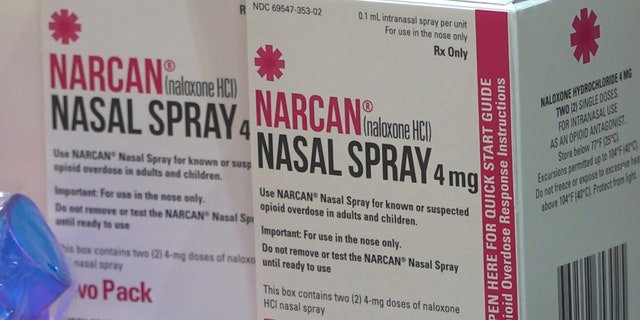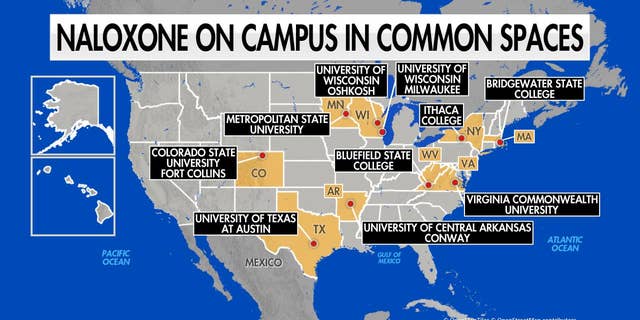Naloxone growing on college campuses as opioid overdoses continue
Milwaukee – College kids are returning to campus this week. Some will now have more access to a lifesaving medication that can treat opioid overdoses.
Over 80,000 Americans died from opioid overdoses last year, a record number. Naloxone is a medication that reverses overdoses. Campus police or student health centers often carry it. But now, some activists say it is time for colleges to get over the stigma of drug use and make Naloxone even more accessible to students.
Just two years ago Erin and Rick Raschwal were dropping their 19-year-old son Logan off at University of Wisconsin-Milwaukee for his freshman year.
“We had a really good home. The kids grew up in a really close-knit family and we were on counseling right away when Logan was in 3rd grade struggling with friendships and social stuff,” Erin said.
WISCONSIN MOM WARNS FAMILIES OF FENTANYL DANGER AFTER SON DIES FROM POISONING: ‘EDUCATE YOUR CHILDREN’
However, on Valentine’s Day 2021, Logan died in his dorm room from an opioid overdose.
“I do think that he was rescued and as hard as that is for us because we have to deal with the pain, I know he’s in a better place,” Erin said, adding that her faith has helped her family through this.
Logan died after taking a Percocet that he did not know was laced with fentanyl.
“Fentanyl has changed the game. It’s a game changer. It’s Russian roulette with your life,” Erin said.
Another student overdosed less than a year later in the same residence hall.
“It could be one pill and you’re done,” Rick said.
DEA WARNS ‘RAINBOW FENTANYL’ IS A ‘DELIBERATE EFFORT BY DRUG TRAFFICKERS TO DRIVE ADDICTION’ IN YOUNG PEOPLE
UW-Milwaukee Police Chief David Salazar said this school year there are naloxone boxes in residence halls, common areas and the library.
“When I was growing up as a kid, you could experiment with things but wouldn’t necessarily kill you. But if you experiment with pills nowadays, one pill can literally kill you,” Salazar said. “Just to be clear, we don’t condone drug use. We don’t condone the abuse of alcohol, but we are intelligent people that understand the way the world works and know that some of our students are going to explore life and come into contact with those substances.”

Fox News research shows at least 10 American colleges offer naloxone in common spaces. Most only have it in the student health centers or pharmacies.
AS FENTANYL CLAIMS YET ANOTHER YOUNG AMERICAN LIFE, KENTUCKY FATHER SHARES HIS STORY
“Universities are very complicated. They’re very political. They’re very politicized,” Dylan Dunn said.
Dunn is the assistant director of SAFE campuses, training and professional development with Safe Project. He works with colleges across the country to prevent deadly overdoses.
“When I was doing this work in 2018 – 2019, most campuses again, wouldn’t touch naloxone with a 10-foot pole,” Dunn said. “The final barrier ends up being how do we communicate about this without making a single one of our alumni, donors, families think that we have a problem here.”

Dunn said he is not trying to enable drug use but wants to make sure these kids are still alive so they can get help for their substance abuse. He said if people are going to do drugs, they should know about the Never Use Alone hotline. People can call when taking drugs and they’ll stay on the phone with you and call EMS if you overdose.
Fox research shows that these colleges offer Naloxone in other places besides the student health center, pharmacy or campus police: Virginia Commonwealth University, Bridgewater State University, UT Austin, Ithaca College, UW-Oshkosh, Colorado State University, UW-Milwaukee, Bluefield State University, University of Central Arkansas and Metropolitan State University.
Susan Mullens is the project coordinator for the West Virginia Collegiate Recovery Network. They have trained nearly 2,500 people and distributed 1,800 naloxone kits on campus and in the community since March 2020. They’re working to get more data on naloxone availability on college campuses nationwide. However, a 2021 survey of 36 schools across the country showed that 50% distributed naloxone on campus and only 11% had naloxone in residence halls.
Read the full article Here


